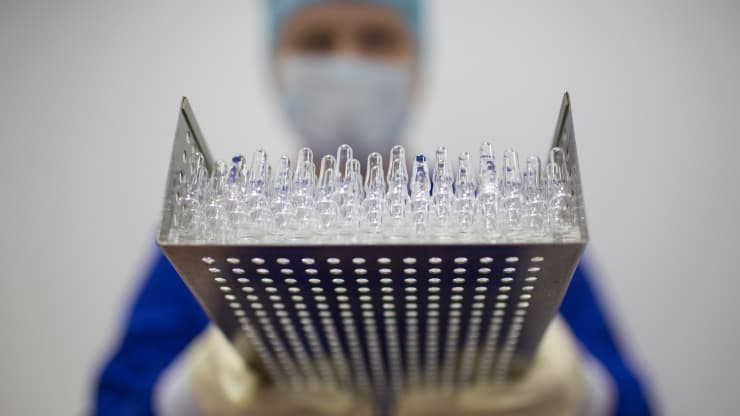Hot on the heels of promising coronavirus vaccine news from the U.K. and U.S., Russia said Tuesday it will make its shot cheaper than its rivals and aims to produce 1 billion doses next year.
“The cost of one dose of the Sputnik V vaccine for international markets will be less than $10,” Russia’s sovereign wealth fund RDIF said. Russia’s coronavirus vaccine requires two doses.
“Thus, Sputnik V will be two or more times cheaper than foreign vaccines based on mRNA technology with similar efficacy rates. For Russian citizens, vaccination with Sputnik V will be free of charge,” RDIF added.
The statement appears to be referring to vaccine candidates from Pfizer-BioNTech and Moderna, which are made from messenger RNA. In the last couple of weeks the companies reported high efficacy rates of their vaccines in late-stage trials.
The Pfizer-BioNTech vaccine is expected to cost around $20 per dose, while Moderna’s CEO said two days ago that its vaccine will cost $25-$37 per dose, depending on the amount ordered. Both require two doses.
The comments from Russia also come a day after British pharmaceutical AstraZeneca and the University of Oxford said an interim analysis of late-stage clinical trials found their vaccine “highly effective.” Their vaccine uses a viral vector approach rather than mRNA technology.
AstraZeneca’s vaccine, which requires two doses, is estimated to cost $3-4 per dose.
1 billion doses
Optimism over the vaccine news has quickly turned to a focus on practicalities, cost and logistics of mass production and distribution.
RDIF said Tuesday that current deals with “leading foreign pharmaceutical companies” meant it was planning to produce enough of its vaccine “for 500 million people per year starting from 2021.” Since it’s a two-dose vaccine, this means it’s targeting production of 1 billion doses next year.
Pfizer and BioNTech have said they expect to produce up to 1.3 billion doses in 2021, whereas Moderna has said it is on track to manufacture 500 million to 1 billion doses globally next year. AstraZeneca said Monday it is making “rapid progress in manufacturing with a capacity of up to 3 billion doses of the vaccine in 2021 on a rolling basis, pending regulatory approval.”
Russia’s coronavirus vaccine was the first in the world to be registered, promoting international skepticism over its efficacy and safety credentials because it had not published any early stage clinical trial data or begun phase three trials at the time.
It has since shared its first interim analysis of phase three trials, and on Tuesday published the second interim analysis of trial data. It said the results showed the vaccine had a 91.4% efficacy at preventing coronavirus infection after 28 days and was over 95% effective after 42 days. The trial evaluated the data after there were 39 confirmed coronavirus cases among the 18,794 volunteers who received both doses of the Sputnik V vaccine or a placebo.
RDIF reiterated that its trial results will be published by the country’s Gamaleya Center team “in one of the leading international peer-reviewed medical journals” but did not say when. It added that after the completion of phase three clinical trials, it will provide access to the full clinical trial report.
Leave a comment








